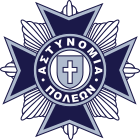- Cities Police
-
Cities Police
Astynomia Poleon
Αστυνομία ΠόλεωνCities Police badge, 1974–1984 Agency overview Formed 1921 Dissolved 1 November 1984 Superseding agency Hellenic Police Employees 10,000–12,000 Legal personality Governmental: Government agency Jurisdictional structure Governing body Ministry of Public Order General nature Operational structure The Cities Police (Greek: Αστυνομία Πόλεων) was a Greek police force extant from 1921 to 1984, responsible for policing urban areas. It complemented the Greek Gendarmerie, which was responsible for rural and suburban areas.
History
Its creation was decreed in 1918 (Law 1370/1918) and confirmed in 1920 (Law 2461/1920). The force became operational in the city of Corfu in 1920, followed by Patras (1921), Piraeus (1923) and Athens (1929). Remarkably, in Thessaloniki, Greece's second city, the force was not established due to the Gendarmerie's opposition, despite the law's provisions.
Unlike the paramilitary Gendarmerie, which had close ties to the Hellenic Army and was commanded by Army generals, the Cities Police was a purely civilian force, modelled after the London Metropolitan Police and with training provided by a British mission under Sir Frederick Loch Halliday.[1]
From the late 1920s, the Cities Police, and especially its feared General Security office, initiated the state persecution of the nascent Communist Party of Greece, whose popularity was growing among the urban poor, the working classes and the destitute refugees from Asia Minor. In the aftermath of the Greek Civil War, the Gendarmerie and the Cities Police became bastions of the conservative and vehemently anti-Communist establishment, a role they would retain throughout the Regime of the Colonels from 1967 to 1974. After the fall of the Colonels, emphasis was placed on civilian policing. Despite strong opposition from the Gendarmerie, the Cities Police and the Gendarmerie were amalgamated on 1 November 1984 (Law 1481/1-10-1984) into the unified Hellenic Police.
Ranks
Cities Police Officer Ranks & Insignia Chief
ΑρχηγόςDeputy Chief
ΥπαρχηγόςBrigadier
ΤαξίαρχοςPolice Commissioner
Αστυνομικός ΔιευθυντήςDeputy Commissioner
Αστυνομικός ΥποδιευθυντήςPolice Captain I
Αστυνόμος Α'Police Captain II
Αστυνόμος Β'Police Lieutenant I
Υπαστυνόμος Α'Police Lieutenant II
Υπαστυνόμος B'Cities Police NCO Ranks & Insignia Police Warrant Officer
ΑνθυπαστυνόμοςChief Warden w. 20 years service
Αρχιφύλακας με 20 έτη υπηρεσίαςChief Warden
ΑρχιφύλακαςReferences
- ^ Smith, Michael Llewellyn (2004). Athens: a cultural and literary history. Signal Books. p. 187. ISBN 9781902669816. http://books.google.gr/books?id=1_rAohrmHwsC.
- This article incorporates information from the Greek Wikipedia published under the GFDL (contributors).
Categories:- Defunct law enforcement agencies of Greece
- 1921 establishments in Greece
- 1984 disestablishments
Wikimedia Foundation. 2010.












